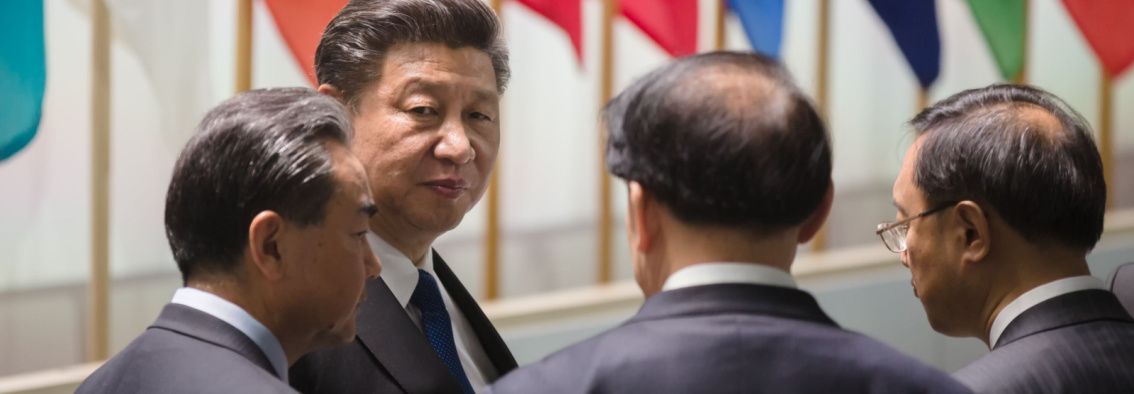Is the world entering a new age of global disorder? Signs point to yes: we see simultaneously the biggest armed conflict in Europe since World War II, a war in the Levant, and a short, sharp war in the Caucasian enclave of Nagorno-Karabakh. These seemingly separate conflicts are in fact connected not just by a coincidental moment in time, but by the actors involved. From Russia to Iran to a veritable smorgasbord of terrorist groups, bad actors have unleashed turmoil in a swath of territory stretching from Ukraine to Azerbaijan to Yemen.
Behind them all stands the People’s Republic of China (PRC). Beijing has sought to give the appearance of being an independent peacemaker. But the veil it has erected is transparent in nature. It is less interested in peace, stability, and justice for the victims of aggression than it is in fostering a global state of affairs in which China can more easily pursue its own ends. For now, disorder suits Xi Jinping (習近平) just fine.
Defining Disorder
Is this burgeoning period of global history truly different from what preceded it? After all, there is no period in living memory in which the world can truly be said to have been at peace. Since the close of World War II, the United States has fought wars or engaged in military interventions in East Asia, Southeast Europe, the Middle East, Africa, the Caribbean, and Latin America. Insurgencies and civil wars have been regular features across much of the developing world. Terrorism has been an ever-present concern since the 1970s. The Rwandan Genocide occurred during what might be considered the high-water mark of global order in the 1990s, with the genocide in Darfur following just a decade later.
Yet, both the Cold War and post-Cold-War eras featured an order of a kind, even if that order was at times quite bloody. Henry Kissinger helpfully defined world order as “the concept held by a region or civilization about the nature of just arrangements and the distribution of power thought to be applicable to the entire world.” Whatever the order, its durability depends on its general acceptance, or legitimacy, and a balance of power that can sustain it. For much of history, orders have been regional, rather than worldwide, in nature. That changed beginning in the nineteenth century, when Europe’s Westphalian order went global.
What is the Westphalian order? According to Kissinger, “it relied on a system of independent states refraining from interference in each other’s domestic affairs and checking each other’s ambitions through a general equilibrium of power.” Those fundamental features remain, even as the system has evolved:
The contemporary, now global Westphalian system […] has striven to curtail the anarchical nature of the world with an extensive network of international legal and organizational structures designed to foster open trade and a stable international financial system, establish accepted principles of resolving international disputes, and set limits on the conduct of wars when they do occur.
Those modern-day structures arguably include the norm of peacefully resolving international disputes, the law of armed conflict, freedom of the seas, the United Nations system, and the World Trade Organization (WTO), the World Bank, and the International Monetary Fund (IMF). Arguably, each of these contributes to the presiding order’s legitimacy and enables the balance of power needed to ensure its survival.
The United States sought to reshape global order in the wake of the Soviet Union’s dissolution. In particular, it aimed to weaken the norm against interfering in the domestic affairs of others—not because it was eager to meddle in the nitty-gritty of foreign political processes, but because it saw the unipolar moment as a moment in which it could, finally, give in to its evangelistic impulses. Here was an opportunity to fulfill the destiny Thomas Jefferson had foreseen for the United States: that it would become an “empire for liberty,” spreading democracy to the furthest reaches of the world.

Image: Russian President Vladimir Putin, CCP General Secretary Xi Jinping, and Iranian President Hassan Rouhani (with Belorussian President Alexander Lukashenko in the background) appear together at a meeting of the Shanghai Cooperation Organization (SCO, 上海合作組織) in Bishkek, Kyrgyzstan (June 2019). (Image source: Express Tribune, July 15, 2020)
Even so, the basic nature of the Westphalian order—a system of sovereign states coequal in status if not in power—remained largely unchanged, despite America’s more fulsome embrace of liberal internationalism and despite movements in some regions, notably Europe, toward supra-regional organization.
The Westphalian order, and especially its modern structures, is now under threat. Moscow’s and Beijing’s imperial pretensions, though distinct, both harken to earlier eras in which their Russian and Chinese forebears had yet to buy into the Westphalian approach to international organization. The Russian cyberattack on Estonia in 2007, the invasion of Georgia in 2008, the illegal annexation of Crimea in 2014, and the full-scale assault on Ukraine in 2022 all made manifest what Putinistic rhetoric had long espoused: a worldview in which Russian neighbors are not sovereign states, properly understood. Russia now stands at the precipice of a return to the tsarist approach of nonstop expansion; whether Russia topples over the edge depends in large part on what happens in Ukraine.
China, meanwhile, has long bristled at a world order in which it is supposed to be bound by rules it did not write—and in which it is simply one country among many equals, both in Asia and globally. Beijing has set out to reestablish a Sino-centric order, at least in its own neighborhood—and perhaps beyond. Domestic and international economic policy and the Belt and Road Initiative (BRI, formerly known as “One Belt, One Road,” 一帶一路) are designed to ensure that all economic roads lead to Beijing. Investments in military power and the increasing use of that power are meant to ensure Beijing can secure by intimidation and force what foreign economic interests alone do not guarantee: that China, and China alone, sits atop a new Asian hierarchy, in which might makes right and which the Chinese Communist Party (CCP) can rule over something like a modern-day tributary system.
Iran and its Shiite satellites, including Hamas and Hezbollah, have a very different idea of international order, but share with Russia and China opposition to the presiding order today. Tehran’s goals in some ways call to mind pre-Westphalian Europe, in which sectarian differences drove interstate conflict. Iran remains committed to “exporting” the revolution, by which it aims to spread Shiism and provide Shia Muslims with the ideological, military, and economic tools to defeat “imperialists.” Despite Hamas’s role in governing Gaza, its objectives are similarly religious in nature, according to its own covenant: “They are the fighting against the false, defeating it and vanquishing it so that justice could prevail, homelands be retrieved and from its mosques would the voice of the mu’azen emerge declaring the establishment of the state of Islam, so that people and things would return each to their right places and Allah is our helper.”
Russia, China, Iran, and Hamas are all, then, revisionists. They may not agree on what world order should ultimately look like—or whether there should even be a world order—but they are united in opposition to the order as it stands. And they are making headway. The world now may be approaching a moment in which, to use Kissinger’s framing, no single concept of order enjoys widespread legitimacy and the balance of power that has long upheld the presiding order proves no longer up to the task.
Richard Haass, former president of the Council on Foreign Relations (CFR) and longtime US diplomat, is right when he argues that “the term ‘order’ implicitly also reflects the degree of disorder that inevitably exists.” But what happens when disorder—or the lack of any agreed upon framework for organizing the world—reigns supreme?
China Gets Ready to Pounce
At the moment, Russia, Iran, and Iranian state and nonstate satellites are the main antagonists in the assault on global order. All are striving to wipe fellow sovereign states off the map, and have strained against or ignored entirely the “international legal and organizational structures” that Kissinger points to as aimed at curtailing “the anarchical nature of the world.” Beijing has decided not to stand in their way. Indeed, China has provided modest but important support for their efforts. Xi Jinping, perhaps, assesses that once others have done the hard work of tearing down global order, China can swoop in to rebuild order in its own image.
In the meantime, Xi is likely assessing what he can get away with in this incipient age of global disorder. He may already be trying to take advantage, most notably in the South China Sea. The past year has been marked by near-unrelenting pressure on the Philippines. That it is targeted at the only American treaty ally with South China Sea claims is no accident. Beijing is clearly testing the Biden Administration at a time when it is grappling with other conflicts and has been signaling that it is eager to stabilize US-China relations. Put another way, he is testing both the legitimacy of an order in which international differences are supposed to be solved peacefully and whether American (and allied) power is capable of upholding it.
What Xi learns in the South China Sea and from observing American approaches to countering Russia and Iran could prove ominous for Taiwan, Japan, and China’s other neighbors in Asia. The United States has crucial, regionally specific interests at stake in both Europe and the Middle East, but it also has a more abstract interest in defending the global order in which it has thrived—and under which repeats of the twentieth century’s most abhorrent spasms of bloodletting have been largely avoided. If Washington fails to do so, the risk that China will pounce will grow far more acute.
The main point. The United States has an interest in defending the global order in which it has thrived. If Washington fails to do so, a Chinese turn to aggression will become far more likely.



